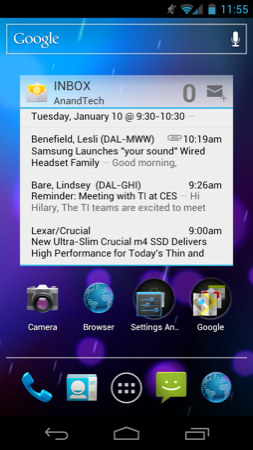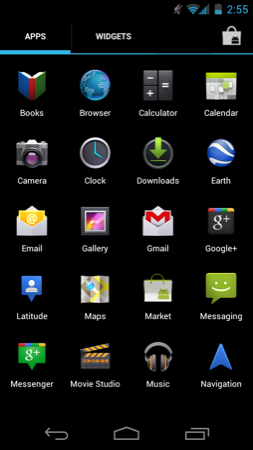Samsung Galaxy Nexus & Ice Cream Sandwich Review
by Brian Klug & Anand Lal Shimpi on January 18, 2012 1:34 PM ESTGoogle employs more than 20,000 people worldwide and the number of them working on Android are in the single digit percentage range. Google's business is search, but it has always had aspirations of more. Android isn't just a chance to capitalize on mobile search for Google, it's also an opportunity to grab power in the next era of personal computing. If you believe that smartphones will eventually replace mainstream PCs, who wouldn't want to be to smartphones what Microsoft was to PCs in the early 1990s?
Previous versions of Android have been cautious, evolutionary steps along a path to being a more open/flexible alternative to iOS. Starting with Honeycomb (Android 3.0) however, Google began to step out of the shadow of its competitors and really start to define Android as a mobile computing platform. Honeycomb was limited to tablets but its successor, Ice Cream Sandwich (Android 4.0), would bring unification to Android across both tablets and smartphones.
Today we look at both ICS and its launch vehicle, Google's Galaxy Nexus.
The Android vs. iOS Debate
It's very clear to me now more than ever that Apple and Google have completely different goals with their mobile OS strategies. Excluding the unclear strategy behind Chrome OS, Android is pretty much Google's primary operating system. The unified tablet/smartphone strategy behind Ice Cream Sandwich makes sense because for Google to succeed in the OS business it needs to deploy Android on everything from smartphones to notebooks. We've already seen the strengths in having a smartphone platform with a strong app ecosystem. Things become even more appealing if you have a phone, tablet and PC that all run the same OS and apps. As Android is Google's one-size-fits-all operating system, it needs to have a broader and slightly more ambitious focus than iOS otherwise it risks losing the race in the long run.
Apple is in a different position. It already has a successful desktop/notebook OS that is continuing to grow. While iOS has been a runaway success for Apple, the Mac OS X platform is a solid option for any user who needs more than their iPhone or iPad can provide. The two OSes may converge or at least borrow heavily from one another, but in the interim they can remain independent. If you need more of a computing experience Apple is happy to sell you a Mac. If you want the it-just-works appliance experience in your phone or tablet, Apple has a whole bunch of iPhone/iPad configurations to offer you.


ICS isn't a step towards iOS. If anything it proves that Google is committed to its own trajectory. Android is an OS that, although more closed than many would like, still allows more flexibility than iOS. You can sideload apps not purchased in the Market. The file system isn't completely hidden from you. You can even override the default zoom level on web pages. Apple and Google both pour tons of time and research into figuring out the best way to do something. And, to be honest, I feel like Apple generally does a better job of "getting it" for the very mainstream consumer. Rather than attempt to make the perfect mold however, Google gives you one that's a bit more flexible.
I've said this before but I do believe that Apple is trying to deliver more of an appliance experience, whereas Google is providing you with a modern take on a traditional computing experience. If the appliance is a smartphone, then both approaches are equally capable - it's just a matter of personal preference.
What's new in ICS really falls into one of three categories:
- Improvements in UI frame rate due to OpenGL ES rendering (non-skia) path
- UI tweaks
- New features
Nowhere in this list is a fundamental change in the way Android works. I feel that this is a very important point to understand and likely the cause for lots of disagreement when it comes to just how impressive (or not) ICS is.
ICS is smoother, more polished and has its own set of new features that make it a significant step forward for Android. What ICS is not however is an outright clone of iOS. If you prefer the iOS experience to Android, ICS will do nothing to change your opinion. If all you were missing from Android was a smoother UI, then its fourth major release should be almost everything you could ask for.










185 Comments
View All Comments
JohnJackson - Wednesday, February 8, 2012 - link
You mean the one where the devices were running the benchmarks at the respective device's NATIVE resolution? 960x640 has 60% more pixels than 800x480...http://www.anandtech.com/show/4064/glbenchmark-20-...
Subzero0000 - Thursday, January 19, 2012 - link
Where do you get "lag" in iPad 2?I use it everyday and the only lag I found is when I slide to the spotlight screen, or browsing webpage (while rendering).
sonelone - Thursday, January 19, 2012 - link
Seriously, where do you get lag on the iPad or iPhone? With the SGX543MP2 rendering nothing but a grid of icons, getting lag would be ridiculous.augustofretes - Thursday, January 19, 2012 - link
Pseudo power users, judging mobile operating systems based on their home screens since 2007.audioman83 - Thursday, January 19, 2012 - link
LOL agreed. So sad.Owls - Thursday, January 19, 2012 - link
blah blah blah I don't like my iphone/ipad being compared so let me make fun of that person for being objective.I know the gnex is not perfect but guess what, neither is your apple product. We all live with compromises and this is no different. However, I refused to be ripped off by apple AND be forced to use itunes.
sorry mr apple user.
Subzero0000 - Friday, January 20, 2012 - link
Firstly, I think you are over-reacting (so did augustofretes).See, I wouldn't complain if someone finds a few lag on Android, because I appreciate the fact that Android is running true-multitasking, with all the widgets and background tasks give us the flexibility that iOS can never dream of.
But then, you cloud your judgment with hatred...
For example, I use Windows 7 at home, Android for phone, iPad for everything else (reading, browsing, gaming, etc...).
I use Google account to sync calendar+contact between Android and iPad.
I buy books in Amazon, and read them through Kindle app on iPad.
I upload my own mp3 to iPad through iTunes, no problem.
Mobile games are better quality on iOS (the truth), so I am happy to buy in AppStore.
There is nothing forcing you to use iTunes.
and "ripped off"? I actually think iPad is cheap, as a outstanding CONSUMER product.
So, calm down, it's just a product. And have a nice day :)
medi01 - Friday, January 20, 2012 - link
Yeah, nothing is "forcing" you to use iTunes apart from the fact that many Apple's products won't even switch on for the first time without itunes.Subzero0000 - Friday, January 20, 2012 - link
Well, what is the matter with one-time activate with iTune?If you find that annoying, then how about the procedure to root/flash your Android, or jb your iOS.
How on earth would a tech-savvy find it annoying/difficult for such a easy task (iTune) ???
I am really confused.
Do you ever forget about the brand-hate and not being stubborn for a second?
btw, I remember I got my iPad activated at the store, their staff open the box and do it for me anyway. I could have done it by myself, but hey, it's "customer service".
oh, and if you think iTune is crap, wait till you try Samsung's "equivalent" (KIES)...
medi01 - Saturday, January 21, 2012 - link
Oh, now easily you've switched from "nobody is forcing you" to "what's the deal".It's not one time activate with most devices it's "one time activate and this PC is your only way to put stuff on your device, unless you are using yet to be closed internet way of doing it".
@@@If you find that annoying, then how about the procedure to root/flash your Android, or jb your iOS.@@@
Could you get a clue, before whining about stuff about which you have very little idea? The only reason I had to root android device, was bacause it was rather old OS with fonts that didn't contain glyphs I needed.
And one thing you're completely missing, dear "I'm not an apple fanboi", YOU DON'T HAVE TO ROOT YOUR ANDROID DEVICE TO GET ACCESS TO IT. You don't have to root it to access it as a hard drive. Neither do you have to root it to install whatever you want on it.
@@@oh, and if you think iTune is crap, wait till you try Samsung's "equivalent" (KIES).@@@
I've never used KIES (even though I have a phone and a tablet by Samsung), so it's hard to compare them. But unlike apple "customers", android users have absolutely no need in using KIES.